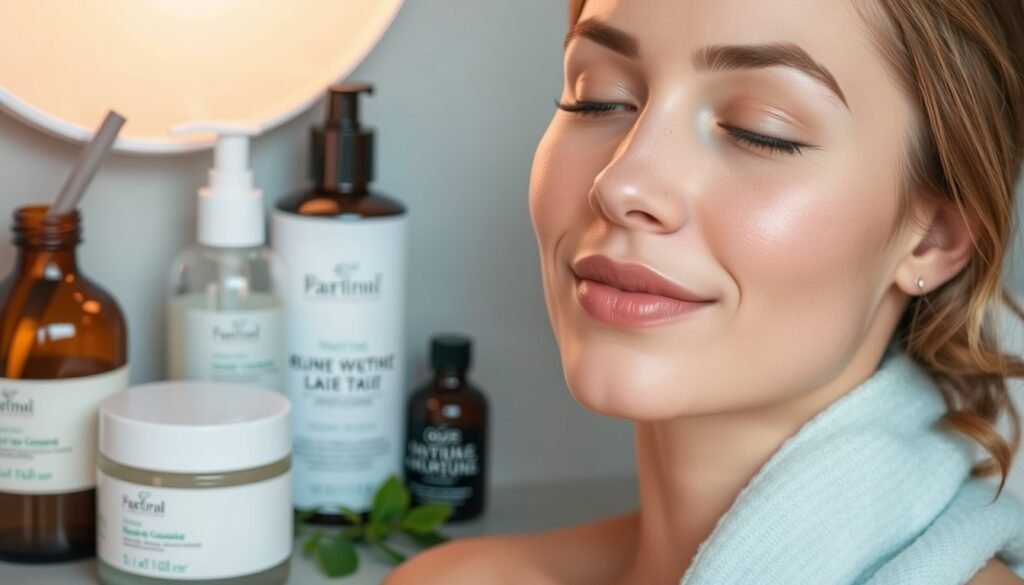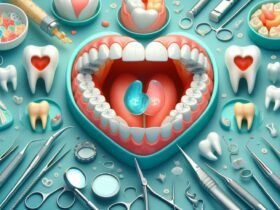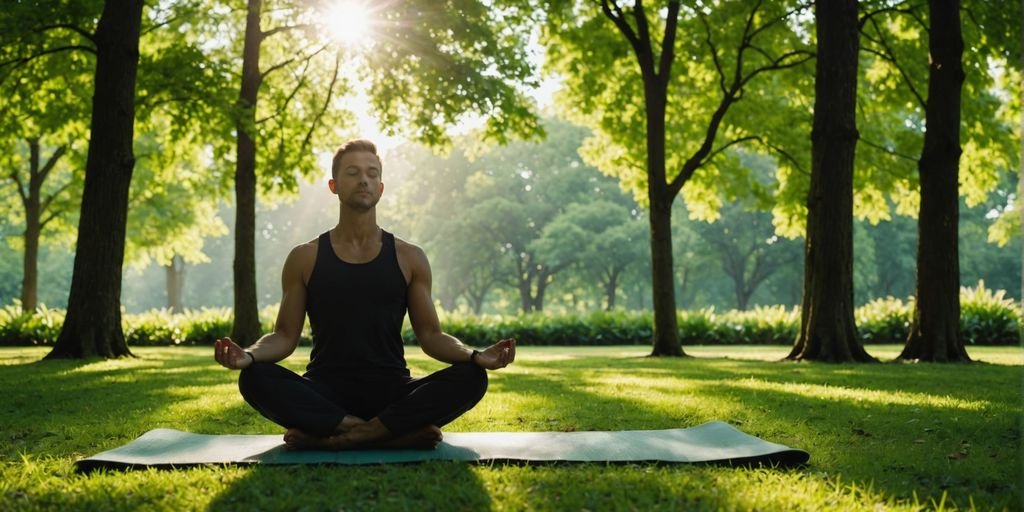Table of Contents
Living a balanced life means taking care of both your body and mind. It’s not just about eating right or exercising, but also about making time for yourself and those you care about. By following some simple health and wellness tips, you can start to feel better and live a more fulfilling life.
Key Takeaways
Eating real, whole foods can boost your health and energy levels.
1. Eat Real Food
Eating real food means choosing whole, single-ingredient items that are unprocessed and free from additives. Incorporating these foods into your daily routine can boost your health, help manage your weight, and provide you with more energy. Here are some tips to get started:
Real food is not only good for your body but also supports local farmers and the environment. By making these choices, you contribute to a healthier planet and a clearer mind.
For more guidance, consider reading a healthy eating book or consulting a holistic health nutritionist. They can provide personalized advice and help you create a holistic diet that works for you. If you’re in the city, you might find some great options for healthy food NYC. For those who love to read, the best book on nutrition can offer valuable insights into making better food choices.
2. Snack Smart
Snacking smartly is essential for maintaining energy levels and avoiding unhealthy cravings. Here are some tips and ideas for healthy snacking at work and home.
Smart snacking can make a big difference in your overall health. By choosing nutritious options, you can stay energized and focused throughout the day.
For those seeking additional guidance, consider online coaching fitness programs that offer personalized advice on healthy eating and snacking.
3. Take Your Vitamins
Taking your vitamins is a simple yet effective way to ensure your body gets the nutrients it needs. Taking an MVM increases nutrient intakes and helps people obtain recommended amounts of vitamins and minerals when they do not meet these needs from food alone.
Why Vitamins Are Important
Vitamins play a crucial role in maintaining overall health. They help in various bodily functions such as boosting the immune system, supporting normal growth and development, and helping cells and organs do their jobs.
Types of Vitamins
There are several types of vitamins that you should be aware of:
How to Take Your Vitamins

- 1. Consult Your Doctor: Before starting any vitamin regimen, it’s important to consult your healthcare provider.
- 2. Read Labels: Make sure to read the labels for dosage instructions.
- 3. Take with Food: Some vitamins are better absorbed when taken with food.
- 4. Stay Consistent: Make it a habit to take your vitamins at the same time every day.
Remember, vitamins are not a substitute for a balanced diet but can help fill in the gaps where your diet may fall short.
4. Get Some Alone Time
Spending time alone can be very good for your mental health. It gives you a chance to recharge and reflect. When you take time for yourself, you can think about what you really want and need. This can help you feel more creative and energized.
Here are some simple ways to enjoy your alone time:
Alone time helps you feel more creative and energized so you can be at your best when you’re around people.
5. Try Something New

Trying something new can be a great way to boost your creativity and reduce stress. Channel your inner child and engage in activities you loved when you were younger while exploring new activities you’ve always wanted to try. This can be especially beneficial for men over 50 who might be looking to reinvent their routines.
If you’ve been planning to change your routine with some healthy updates, why not start today? Deciding to work toward a healthier you doesn’t mean you have to make big changes all at once. Small steps can lead to significant improvements in your overall well-being.
6. Schedule Your Appointments
Keeping up with your health appointments is crucial for maintaining a balanced life. Make your health a number one priority by scheduling regular checkups and screenings. This includes visiting your dentist twice a year and getting annual checkups at the doctor. Don’t forget to schedule the recommended screenings for your age group.
A wellness planner can be a helpful tool to keep track of all your appointments. It takes a holistic combination of tools, technologies, and processes to remove bottlenecks in your schedule. Here are some tips to help you stay on top of your health appointments:
You’ll feel better with each step you take toward this important self-care investment.
7. Make Time for Your Friends and Family
Spending time with your friends and family is more important than you might think. Humans are social beings and need connections to stay mentally and emotionally healthy. Setting aside time for loved ones can help relieve stress, boost self-esteem, and lead to better choices in life.
Benefits of Spending Time with Loved Ones
Tips for Making Time
- 1. Schedule Regular Meetups: Put family dinners or friend hangouts on your calendar just like any other important appointment.
- 2. Combine Activities: Find ways to include loved ones in your daily routines, like exercising together or cooking meals.
- 3. Stay Connected: Use technology to keep in touch if you can’t meet in person. Video calls and messaging can help maintain strong bonds.
Making time for friends and family isn’t just about socializing; it’s about building a support system that can help you through life’s ups and downs.
8. Take Care of Your Skin

Taking care of your skin is essential for maintaining overall health and achieving a glowing complexion. Here are some simple steps to help you get started:
- 1. Cleanse Daily: Use a gentle cleanser to remove dirt, oil, and makeup from your skin every morning and night.
- 2. Moisturize: Apply a moisturizer suitable for your skin type to keep your skin hydrated and soft.
- 3. Protect from the Sun: Use sunscreen with at least SPF 30 every day, even on cloudy days, to protect your skin from harmful UV rays.
- 4. Stay Hydrated: Drink plenty of water to keep your skin hydrated from the inside out.
- 5. Eat a Balanced Diet: Include fruits, vegetables, and healthy fats in your diet to nourish your skin.
- 6. Get Enough Sleep: Aim for 7-9 hours of sleep each night to allow your skin to repair and regenerate.
- 7. Avoid Smoking: Smoking can cause premature aging and damage to your skin.
- 8. Manage Stress: Practice stress-relief techniques like meditation or yoga to keep your skin looking its best.
Building a daily skin care routine can help you maintain overall skin health or improve concerns like acne, scarring, or dark spots. Find a cleanser, serum, moisturizer, and sunscreen that work for you and give your skin the love it deserves.
9. Eat Mindfully
Eating mindfully means paying attention to what you eat and how you feel while eating. This practice can help you avoid overeating and make healthier choices. Taking time to focus while you eat can help you avoid overeating.
Steps to Eat Mindfully
- 1. Slow Down: Take your time to chew and savor each bite. This helps your body recognize when it’s full.
- 2. Eliminate Distractions: Turn off the TV and put away your phone. Focus on your meal and the experience of eating.
- 3. Listen to Your Body: Pay attention to hunger and fullness cues. Eat when you’re hungry and stop when you’re satisfied.
- 4. Enjoy Your Food: Appreciate the flavors, textures, and aromas of your meal. This can make eating more enjoyable and satisfying.
Mindful eating isn’t a fad diet. It’s a way to listen to your body and make better food choices.
Incorporating mindful eating into your daily routine can support a healthy mindset and contribute to your overall well-being. This approach aligns with principles of holistic health coaching and integrative health and wellness, promoting a balanced and fulfilling life.
10. Stay Well Hydrated
Staying hydrated is crucial for maintaining good health. Your body is made up of about 60% water, and it needs a steady supply to function properly. Here are some health and wellness tips to help you stay hydrated:
Staying hydrated is one of the simplest yet most effective health and wellness ideas. It supports everything from digestion to skin health.
Benefits of Staying Hydrated
How Much Water Do You Need?
The amount of water you need can vary based on factors like age, gender, and activity level. However, a common guideline is to drink at least 8 glasses (64 ounces) of water a day. If you’re active or the weather is hot, you may need more.
| Age Group | Daily Water Intake (cups) |
|---|---|
| Children (4-8) | 5 |
| Children (9-13) | 7-8 |
| Teens (14-18) | 8-11 |
| Adults | 8-12 |
Remember, these are just guidelines. Listen to your body and adjust your water intake as needed. Staying well-hydrated is a key part of any wellness guide and can help you meet your health challenge goals.
Conclusion
Living a balanced life is all about making small, manageable changes that add up over time. By focusing on eating real food, staying hydrated, getting enough sleep, and making time for exercise, you can improve your overall well-being. Remember, it’s also important to take care of your mental health by spending time alone, trying new things, and connecting with friends and family. These simple steps can help you feel better both physically and mentally. Start today and take one step at a time towards a healthier, happier you.
Frequently Asked Questions
What is real food?
Real food refers to whole, single-ingredient items that are unprocessed and free of additives. Eating real food can boost your health, help manage your weight, and increase your energy levels.
How can I snack smart?
To snack smart, choose options like mixed nuts, veggies, Greek yogurt, or a piece of dark chocolate. These snacks are satisfying and won’t weigh you down.
Why should I take vitamins?
Vitamins and minerals are essential for your health. Even with a balanced diet, it can be hard to get all the nutrients your body needs from food alone. A good multivitamin can help fill in the gaps.
Why is alone time important?
Spending time alone is good for your mental health. It helps you get to know yourself better, figure out what you want, and live a more purposeful life.
How often should I try something new?
Trying something new at least once a month can keep your mind engaged and lively. It could be joining a book club, signing up for a class, or starting a new hobby.
Why is it important to schedule appointments?
Regular checkups with your dentist and doctor are crucial. They help catch potential health issues early and ensure you stay on top of recommended screenings for your age group.














Leave a Review